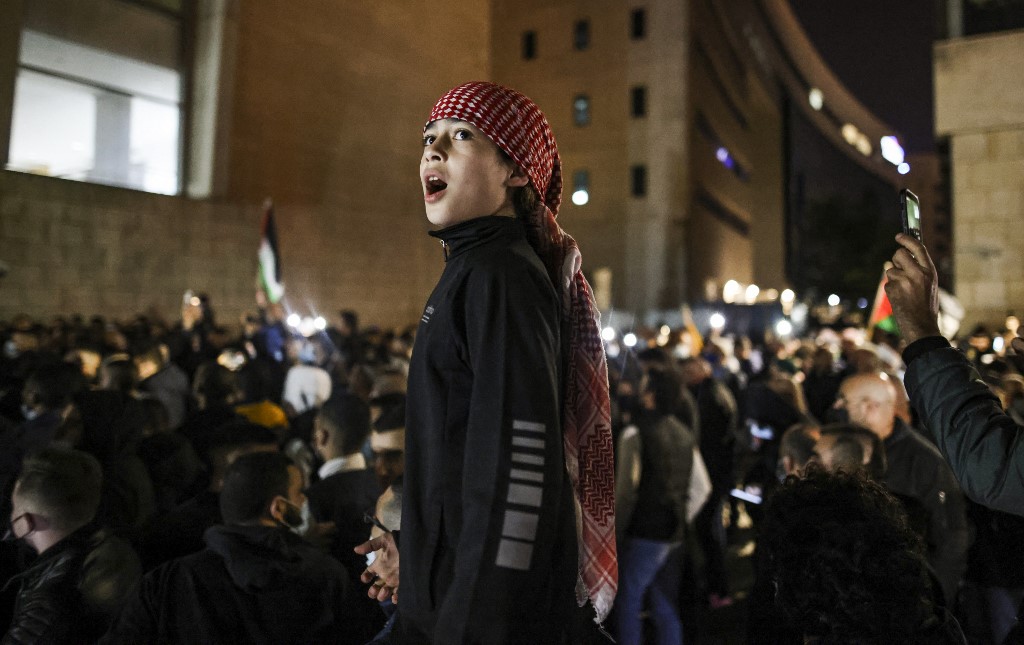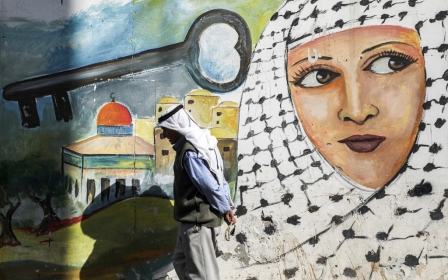One year on, Haifa's uprising is inspiring a united Palestinian movement

It was an existential battle. In May 2021, large groups of Jewish settlers, protected and supported by the Israeli police, invaded Palestinian neighbourhoods in Haifa.
The northern port city was not alone in its response. Across towns in historic Palestine and its coastal cities with their “mixed populations”, protests against the Israeli assaults began. It came to be known locally as the “Karamah Uprising.”
'The Israeli police’s assault, repression, and arrests of Arabs in Haifa led to a backlash'
- Somaya Falah, activist and PhD student
This wasn’t simply a response to settler lynch mobs and the Israeli far right. Israel’s police also carried out a number of assaults on Palestinian coastal cities, while providing settlers with protection in Akka, Jaffa, Lydd, Ramla and Beersheba.
This resulted in the death of two Palestinains: Musa Hassouneh from Lydd, and Muhammad Kiwan from Um al-Fahm, in addition to hundreds of wounded and thousands arrested (dozens of them remaining in Israeli prisons to this day).
The uprising continues to reverberate. Israeli intelligence fears a new revolt in the Arab towns inside the Green Line and so - on the first anniversary of the uprising - Israeli police commissioner Yaakov “Kobi” Shabtai and Border Police chief Amir Cohen announced the formation of a brigade called “the national guard”, set up to suppress Palestinian protest and act as an emergency response team.
Stay informed with MEE's newsletters
Sign up to get the latest alerts, insights and analysis, starting with Turkey Unpacked
A year since the uprising, though, efforts to organise protests in the coastal cities, especially Haifa, are ongoing. This movement has been incorporated into the wider Palestinian body politic, a development that worries the Israeli security establishment, which has failed to stamp out the embers of the Karamah Uprising among Palestinian citizens of Israel.
Beginnings
In their attempts to deter civil society and popular resistance, Israeli authorities and police have pursued dozens of young men and women, putting them under interrogation and prosecuting them.
The Israeli police has arrested numerous activists from the Herak Haifa group over the past ten months, said Somaya Falah, a researcher and PhD student at Technion - Israel Institute of Technology, due to the group’s activities and organisation of regional protests in Haifa in mid-May last year. She was among them.
The magistrate’s court in Haifa renewed Falah’s arrest many times over. After pursuing legal measures against her for 10 months, it withdrew its prosecution after its claims were debunked.
The Israeli prosecution had issued a court order to ban her from participating in any protests or activities, or from speaking to the media - a moratorium that ended in March.
Falah told Middle East Eye about her experience with Herak Haifa, which was founded in 2018 and placed Palestinian women at its fore, becoming an incubator the activities and protests of the Karamah Uprising.
Shin Bet, Israel’s internal intelligence agency, accused Falah of “communicating with a foreign agent and endangering the lives of the citizenry” in order to deter her from continuing to organise activities and protests in Haifa.
She told MEE that the uprising broke through the wall of fear, especially for young people, and placed women at the centre of activity in support of the Palestinian cause.
The PhD student spoke about the increased influence of Palestinian women in activist movements in Haifa and other coastal cities, and talked about the beginning of the uprising.
“The Nakba has always been commemorated annually by lighting the candles of return in Haifa’s Palestinian neighbourhoods, which coincided with the Israeli onslaught on the Palestinian people in Jerusalem, al-Aqsa Mosque, Sheikh Jarrah, and the Gaza war,” Falah said.
“This spark ignited the popular protests in Haifa, and continued for an entire week.”
Those early protest days took place in and around Carmel Avenue and the German Colony neighbourhood, as well as other Palestinian neighbourhoods in Haifa. Large numbers of mostly young people came out onto the streets in a peaceful protest that was met with unprecedented repression by the Israeli police.
“The Israeli police’s assault, repression, and arrests of Arabs in Haifa led to a backlash as the Herak began to pick up steam and the protests began to spread, continuing for an entire week, and hundreds of arrests did not stop the spread of the protests and mobilisations,” Falah told MEE.
Conflict and friction
According to political activist and writer Amir Mahkoul, the Karamah Uprising reflects the historical significance of Haifa, which has witnessed in the last two decades several milestones that transformed it into a Palestinian urban centre inside the Green Line - the first of its kind since the Nakba.
Haifa is home to 60,000 Palestinians who reside there permanently, while approximately 20,000 Palestinian students go there for university and college education. The city is also unique for being in direct and constant friction with Israeli society.
Makhoul told MEE that Haifa, which has a population of 300,000 (240,000 of whom are Jewish), has become in recent years a primary cultural, political, and youth hub for Palestinian citizens of Israel, and has become the largest gathering of Palestinian youth among Palestinians with Israeli citizenship.
These young people have continued the historic struggle of opposing Judaisation and the expulsion of Palestinians, as well as the related battle to reclaim Islamic and Arab land and assets and the maintenance of an Arab presence in Haifa’s Palestinian neighbourhoods.
Makhoul believes Haifa has become a main launching point for political, factional and national forces in historic Palestine.
For that reason, the city, which is still living through the Nakba in its Wadi Saleeb and German neighbourhoods, drew many movements, protests, and actions as part of broader developments in the Palestinian cause in the years leading up to May 2021.
Palestinian cohesion
The strength and determination to resist shown in Haifa has, Makhoul said, “taken on different forms, whether they be national, political, cultural, artistic, educational, or academic - all of it strengthening the movement and engagement with the Palestinian cause.”
The activist believes the uprising proved that the Israeli establishment, in all of its forms, has been actively working with settler mobs, and that this can be seen in assaults on Palestinians in coastal cities, as well as the concentration of settlement outposts in the middle of neighbourhoods in those cities.
This plan was thwarted by the continuous activity of the movement in Haifa, as well as the escalation of the movement in Lod during that phase.
For Makhoul, the uprising highlighted the failure of the Israeli establishment to marginalise the Palestinian cause and prevent Palestinians from across the region coalescing behind one national identity, united by a common destiny despite geographic divisions.
New life for the movement
Journalist Rashad Omari, an activist in Herak Haifa and the Tal’at Feminist movement, echoed this position, saying the uprising had broken the wall of fear that held people back from protesting the policies and actions of the Israeli occupation, or of forming and strengthening ties between Palestinians wherever they may be in the world.
Omari told MEE that the events of the Karamah Uprising breathed new life into the Palestinian cause after Israeli authorities had sought to kill it.
“I participated in the protests and movements in all their different expressions, many of them continuing to this day and including vast swathes of Palestinian society,” Omari told MEE.
“These sectors of society are not factionally affiliated or politicised, and had not previously participated in protests and political activities or national actions.”
In Haifa though, they came together, and a year on they point the way forward for the Palestinian cause.
Middle East Eye delivers independent and unrivalled coverage and analysis of the Middle East, North Africa and beyond. To learn more about republishing this content and the associated fees, please fill out this form. More about MEE can be found here.






